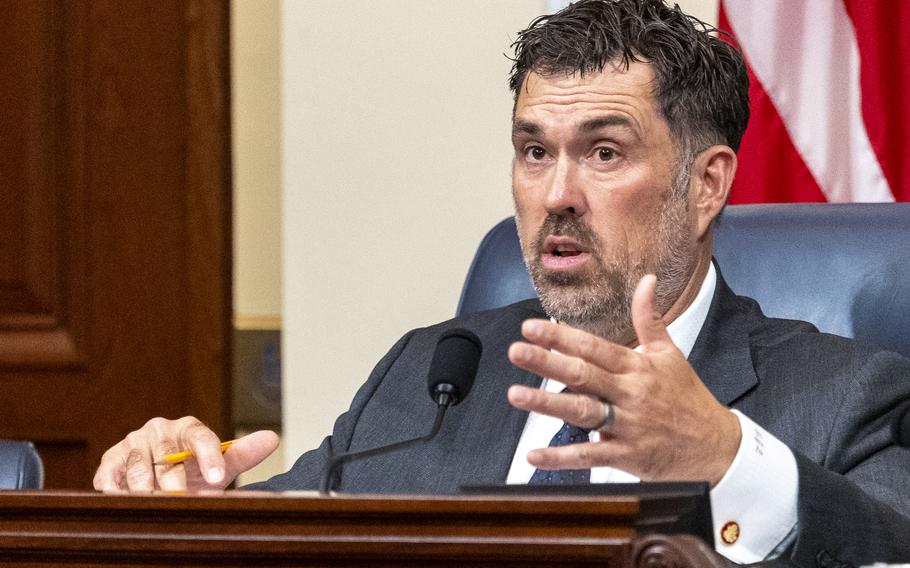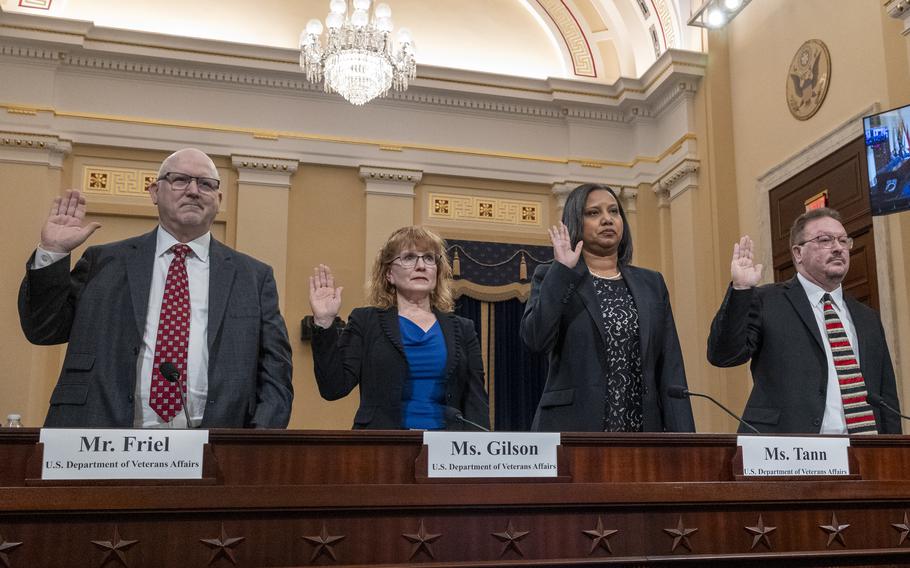
Rep. Morgan Luttrell, R-Texas, speaks at a House hearing on Wednesday, May 14, 2025. Claims processors at the Department of Veterans Affairs were inadequately trained and unprepared for the influx of veterans seeking benefits under the PACT Act, leading to improper decisions and miscalculated payments, a federal watchdog told lawmakers. (Eric Kayne/Stars and Stripes)
WASHINGTON — Claims processors at the Department of Veterans Affairs were inadequately trained and unprepared for the influx of veterans seeking benefits under the PACT Act, leading to improper decisions and miscalculated payments, a federal watchdog told lawmakers on Wednesday.
Federal law entitles veterans to compensation for medical conditions incurred or aggravated from active-duty service. As of Dec. 31, 2024, more than 6 million veterans were receiving these benefits, according to the VA Office of Inspector General.
But a lack of training combined with inconsistent guidance led to incorrect payments to some beneficiaries, said Brent Arronte, deputy assistant inspector general for the office of audits and evaluations at the VA Office of Inspector General. The audits uncovered underpayments and overpayments, which the VA attempts to collect from veterans when they are identified.
Overpayments can result in the VA creating debts that veterans owe back to the agency, “which can create a paperwork nightmare for them and their families,” Rep. Morgan Luttrell, R-Texas, said during an oversight hearing of the House Veterans’ Affairs Committee.
“We must ensure that VA makes every effort to prevent overpayments from happening in the first place,” said Luttrell, chairman of the committee’s subpanel on disability assistance and memorial affairs.

Department of Veterans Affairs officials Kevin Friel, Jeanine Gilson, Nina Tann and Brent Arronte are sworn in at a House hearing on Wednesday, May 14, 2025. (Eric Kayne/Stars and Stripes)
The VA calculated $1 billion in overpayment debts for fiscal 2024 that it sought to collect from veterans and their beneficiaries, said Jeanine Gilson, acting chief financial officer at the VA. But the figure is a small fraction of a total outlay of $161 billion in compensation, she said.
Arronte said IG reviewers found claims processors were not prepared to understand and apply regulations outlined in the Sergeant First Class Heath Robinson Honoring our Promise to Address Comprehensive Toxics Act of 2022, more commonly known as the PACT Act.
Passage of the PACT Act significantly expanded enrollment in VA health care and the number of veterans and their survivors qualifying for compensation, Arronte said.
Nina Tann, executive director for VA’s compensation service, said the agency is committed to making improvements to increase the accuracy of benefits paid to veterans and their dependents.
Tann also said it is critical for veterans and their beneficiaries to self-report changes in their eligibility for benefits, including income, net worth, medical expenses and marital status. Families also must report the death of a VA beneficiary.
“Timely reporting of these changes in beneficiary status significantly impacts VA’s ability to deliver appropriate benefits,” she said.
But Luttrell said the law also allows for VA to cancel these overpayment debts or waive collection. From fiscal 2021 to fiscal 2024, VA issued at least $5.1 billion in compensation and pension overpayments but collected only a portion of the debts, he said.
Veterans also don’t always realize they were overpaid, said Rep. Morgan McGarvey, D-Ky.
“These are large, complex systems, and not only are they run by humans, but they’re also used by humans. That means there will be errors, even with the best possible software,” he said. “We need a genuine conversation on what works and doesn’t.”
Rep. Keith Self, R-Texas, said he’s concerned veterans are not well-informed about when to alert VA to changes that could result in improper payments.
“We haven’t fixed problems, so veterans have the training and understanding about when they need to fix things,” he said.
A statistical sample of PACT Act-related claims from August 2022 to August 2023 found about 25% were improperly calculated, according to the VA inspector general.
From Jan. 1, 2023, to July 31, 2023, the IG estimated survivors of service members who died in the line of duty were underpaid by $33.1 million. The claims were related to toxic exposures under the PACT Act.
Claims processing errors for veterans determined to be unemployable due to service-connected illnesses and injuries led to $85 million in underpayments and $10 million in overpayments from May 2022 through April 2023.
“I would love to say this is an easy fix, that the over 130,000 PACT Act claims will go through without incorrect effective dates, that every veteran who gets divorced will immediately notify the VA before they incur debts or their grieving widow will catch an overpayment during a difficult and confusing time. But that’s not the case. It’s not reality,” McGarvey said.
Arronte recommended the Veterans Benefits Administration improve training for new and existing claims processors.
“There are constantly changing policies, procedures and guidance that claims processors must accurately implement — often with frequent updates dispersed across multiple sources,” he said.
The inspector general reviews also recommended additional staff training on processing complex claims, including for military sexual trauma and ALS, a fatal condition known as Lou Gehrig’s disease.
“These claims require a high level of knowledge and competency to accurately make a decision,’’ Arronte said.
Determining effective dates for claims has posed one of the bigger challenges, he said.
“The proper assignment of effective dates for disability compensation benefits is vital because it establishes the date from which the veteran will start receiving benefits. An incorrect effective date can result in a substantial financial loss to a veteran, as they may not receive all the benefits to which they are entitled,” Arronte said.
Though the VA has an automated tool to determine effective dates, it has not been updated since passage of the PACT Act three years ago, he said.
Tann said the VA realizes that inadequate training often “is at the core of the issue.’’ The agency is enhancing education for claims processors in specific areas, she said.
The VA recently added PACT Act refresher training for claims processors already on the job, she said.